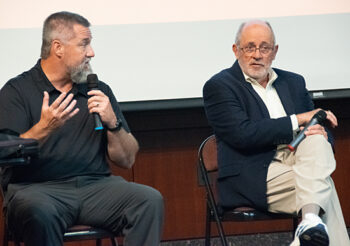Few people attend charter issue meeting
DAVE MOSIER/independent editor
While not many city residents attended a charter government informational meeting on Wednesday, those that did had plenty of questions about the process and its potential benefits and drawbacks.
Presenters for the meeting were Jerry Strozdas, a former law director for the cities of Springfield and New Carlisle and past president of the Ohio Municipal Attorneys Association, and Rod Davisson, a three-term mayor of the Ohio city of Obetz and currently its city manager, as well as an experienced trial attorney who has litigated cases in both Ohio and federal courts.

Davisson began by exploring some of the reasons a community would be interested in having a charter form of government, while noting that it mostly comes down to who makes the decisions for a community.
“It’s really about how do you want your town to run…,” he said. “You can either say ‘we’ll let the guys in Columbus with their grand wisdom tell us how they think it should run or we can decide ourselves’.”
Strozdas followed by talking about the uniqueness of Ohio’s constitution, which, unlike most states where governing power is placed entirely in the hands of state legislatures, provides for “home rule.” And the way for communities to fully implement self-rule governance, he said, is to create a municipal charter.
Strozdas also explained the process municipalities must go through to develop a charter form of government, noting that the charter issue on the November 2 ballot in Van Wert is in two parts: 1. Shall a commission be chosen to frame a charter? 2. Select the 15 people you want to be on the charter commission.
If both of those questions are “yes”, then those chosen to serve on the commission have, essentially, less than a year to develop a charter that will then come before the voters for their approval or rejection.
Strozdas said the job is not an easy one and typically involves many hours of discussion and research by the unpaid commission members before a charter is completed.
“It is a very, very difficult job,” he noted “It is a lot of work; there are a lot of questions to answer.”
Davisson noted that a charter is like a “mini constitution” for a municipality.
“It is a very broad framework for how you want to operate,” he noted, adding that being too specific in how the charter is worded can be problematic for a community if conditions change and the charter is not flexible enough to deal with those changes.
Davisson said there are a number of governmental procedures that can be dealt with by means of a charter, including how many and what officeholders a community has, whether they are elected or appointed, whether municipal elections are partisan or non-partisan, whether a city follows the state’s complex bidding rules or makes its own, and what duties city employees must perform and what qualifications they must have to fill a position.
A charter could also make changes to state civil service regulations, which are often onerous and involved, to give police and fire departments more flexibility in the way they operate.
Strozdas said that, through a charter, municipalities can opt to do things differently than they do currently under state statutory law. Or not. It’s up to the voters to decide.
“It’s your choice; you determine whether (something) is broke, and you determine how you’re going to fix it if you think it is broke,” he noted.
Both men stressed that communities can make as many, or as few, changes to the current statutory system as they feel are needed to improve city government. Often, charter changes are made to have more control over what are now elected positions, such as auditor and law director. Currently, there are no professional qualifications to be a city auditor in Ohio, while law directors, other than being admitted to the state bar, don’t have to have any experience in city legal issues. That could be changed with a charter government.
Davisson used as an example a young clerk-treasurer who was elected in his community, which was then a village, and, because of her inexperience, “wrecked our finances.”
Both presenters also noted, though, that there were some areas of governance that are off-limits to charters, including the state legal system, which is under the sole control of the General Assembly.
Strozdas also said that, if an issue is omitted from the charter, a municipality would simply follow state regulations dealing with that particular issue.
However, no matter what happens in the long run, Davisson said the ballot question of whether to have a charter committee and should a charter be drafted should an easy “yes” for a community’s voters.
“Whether you get that right for your town later and whether it is passed, that is fair game, that could be an easy yes, it could be an easy no . . . but to say ‘we don’t want to try it,’ to me, is ridiculous,” he added. “It’s in your interest to try to get yourselves a way to get some self-determination related to the things you can do.”
POSTED: 09/30/21 at 12:27 am. FILED UNDER: News







